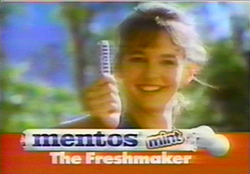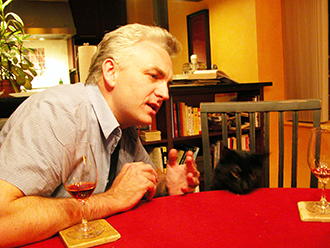One of the great glories of the internet is its ability to connect you with people from all over the world. Some of them creepy, some of them old acquaintances who may or may not be creepy, and some of them completely unexpected brushes with greatness.
Many of you will remember the Mentos commercials of yesteryear. The ones that made everyone scratch their heads and ask, “What the hell was that?” and “Was that serious?”
Those were the commercials that made life look sweet and silly. Carefree, fun-loving commercials which took place in a world free from murderous cartoon riots. A world where broken heels and getting paint on your suit were gut-busting hilarious.
One Mentos spot in particular caught my fancy: A cute young lady’s car is boxed in by a mean-spirited executive type. He’s indifferent. She pops a Mentos. Four guys in overalls move her car for her and all is well. Mentos retains its status as Freshmaker.
Well, that woman just emailed me. She’s in South Africa. She’s never seen the commercial. She’s been trying to get a copy of her commercial for thirteen long, unfresh years.
Thirteen years.
Why me? She found me on the internet. Many years ago I applied my ludicrous film school education to do what film students do to please their Marxo-feminist professors, which is write utter nonsense. Using my acquired skills in bullshit, I compared that particular commercial to the 1917 Bolshevik revolution. It went online and thirteen long years later she Googled it, found me, and has asked for help.
This woman is a legend. She’s part of our generation’s collective memory. She inspired the Foo Fighters.
We are her Obi Wan. If you know where one can find a copy of this commercial, please tell. We can do this. We can reach out and touch history and make a South African actress happy after thirteen Mentoless years. Isn’t that what being fresh and full of life is all about?
Addendum 30 Mar 2006:
Success! A tape arrived. A young woman is very happy. All is fresh with the world.

Should you be interested, this is the piece which connected me with this most fresh celebrity:
THE “CAR MOVERS” OR “OVERALLS AND MENTOS”
Whimsically Sugar-Coated Comedy
or Amazing Parallel to the Bolshevik Revolution?
The “Car Movers” is a classic interpretation of the struggle between the Proletariat worker and the Bourgeois ruling class. Like Sergei Eisenstein’s Battleship Potemkin, The Freshmaker has provided us with a depiction of the injustices suffered by the Working Class, and their subsequent confrontation with the Ruling Class.
In Potemkin, the enlisted man is the hero– representing the Worker, suffering unjustly from the savage treatment they receive from the Officers, who represent the Ruling Class. In Mentos, the working class is represented by a single heroine. Young, fresh and full of life. She drives a vehicle for utilitarian purposes only, unencumbered by the materialistic trappings of the elite. The car is ugly, compact, strangely colored, and by all accounts– uncomfortable. Obviously, its purpose is simple: it functions as part of the State, where individual luxuries take a back seat (pun intended). There is no room for selfish materialism in the New State. Like the hammer and sickle, it represents hard work, sweat, and the elements that contribute to the Communist State– and the ultimate betterment of all people.
Enter the Bourgeois: His vehicle represents the extravagances of the Ruling Class. It is twice as large as the heroine’s vehicle, and does not serve the State. Instead, it is a luxurious self-indulgence. Another example of the selfishness of the wealthy, and the exploitation of the poor. By parking his car in such a way as to inhibit the motion of the heroine’s communist utility vehicle, he drives home a point that is far from subtle: These Bourgeois luxuries impede the growth of the People’s State.
Our heroine protests. Nonviolently, at first. She attempts to convince the elitist upper class that their selfish ways prevent the growth of a true People’s State. Her pleas fall on deaf ears however, and in a coup-de-grace, he motions to his watch. The message: The Bourgeois state will last forever.
This, of course, sets the revolution in motion. And there is symbolism aplenty. In Potemkin, the workers are driven to mutiny in part by the rotten bread and meat forced upon them by the Officers. In Mentos, food products again becomes a catalyst for revolt– by eating Mentos, she brings renewed vigor to her cause.
With the injustices of the Ruling Class before her, and Mentos on her breath, our heroine (symbolizing Mother Russia, matron of the Worker’s Party) rises to the occasion. She rallies her comrades in arms. Clad in overalls and working on a construction site, they are the embodiment of the Working Class. Under the heroine’s leadership, the revolution flows ahead smoothly: There is no power struggle here– All the workers unite to achieve their goal of a People’s State.
Even more stark symbolism: The Bourgeois ruling class, their back turned to the workers, fails to see the revolution coming. When finally, the antagonist realizes his fate, it is too late: The workers have rallied, and with the machinery of the People’s State set in motion, have overcome their obstacles. The ruling class no longer represents a threat to the progress of the Worker’s Party. Our heroine turns to the now deposed Ruling Class, and in a final gesture of solidarity, shows him her Mentos– a gesture that will no doubt linger in the minds of viewers forever. As memorable even, as Potemkin’s ‘Odessa Steps’ scene. The new comrade is forced to smile– because, once and for all, he has realized the folly and injustice of the class hierarchy.


“Marxo-feminist professors”? My God. I’m still having nightmares about them decades after the fact!
Maybe she needs to contact the US division of Mentos. http://www.us.mentos.com/contact.html
Brian, If you google “mentos commercials,” the second page has a link that shows “Video from the official Mentos site. The “Car Movers” or “Overalls and Mentos””
This links to a Yahoo Canada search that has only three results, and one is your essay. One mystery solved, I hope it doesn’t diminish your brush(electronically, at least) with greatness.
[ I found that, but the only commercials online I can find are the current crop, which aren’t as bizarre and accidentally campy as the classics. -B.]
From the first time these commercials came on we knew there was something wrong with them. Then it hit us, they are foreign. Foreign humor just doesn’t make sense to us ‘mericans.
What did your Marxo-feminist professor think of your paper?
I’m still haunted by the one where the old lady chases the rambunctios kid through the department store. He freshly evades her by posing as a mannequin. To this day I have no idea why she was after him. Or what she planned on doing if she actually caught him.
simply amazing…
Wow.
I’ve tried searching for it and have found nothing.
Please keep us updated.
The fact that you don’t post everyday used to piss me off because I love your writing but actually, i’ve found it quite refreshing and it gives me something to look forward to…for example, this post was ummmm-super fantastic.
Is she still cute?
[ Physically – no idea. But her association with Mentos is irresistible. -B. ]
Is she Charlise Theron?
I am going to have to re-watch Battleship Potemkin to see if your paper was on point.
Maximum Freshness
Going out of our way for the star of one of history’s campiest commercials.
just read your essay– I hope you got at least a minor in b.s. holy moly that was good :-)
I’d like to see a different mentos commercial…you see, I was also in a mentos commercial many moons ago and have also never been able to see it. It must be about 10 years now. I would really like to see it! It was one with a girl who changes her clothes in a tee-pee display in a mall. I played her best friend in the commercial…can you connect me with a copy of it like you did with the south african lady? thanks!
lacey